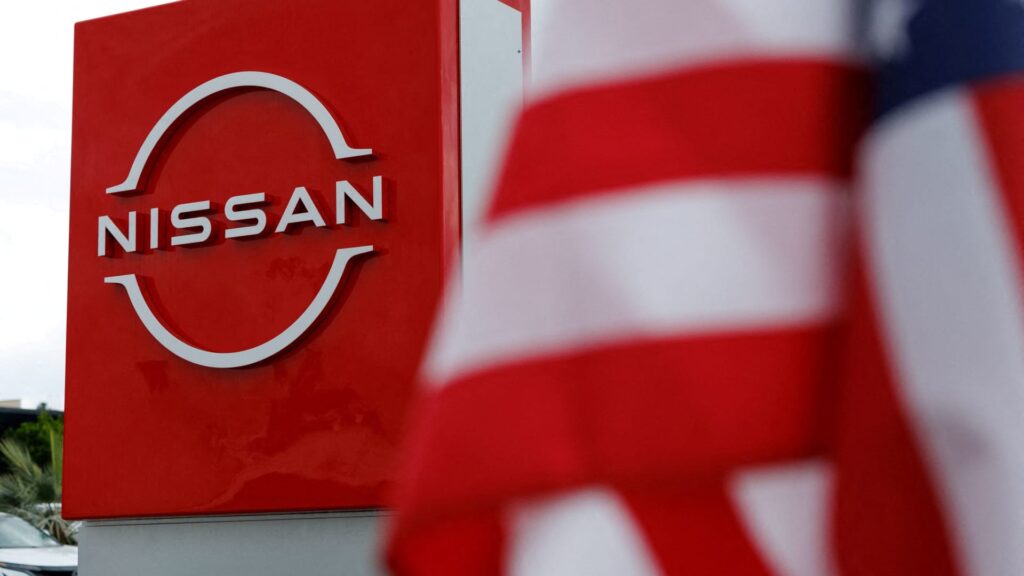
Nissan US Production Expansion: Company Aims to Max Out Tennessee Plant Amid Trump Tariffs
Nissan US Production Expansion: Company Aims to Max Out Tennessee Plant Amid Trump Tariffs
Published on April 19, 2025
The American flag at a Nissan dealership in California. The automaker is accelerating Nissan US Production Expansion plans in response to new tariffs. (Image: Mike Blake/Reuters)
Table of Contents
- Nissan US Production Expansion Accelerated by Trump Tariffs
- Smyrna, Tennessee Plant: The Centerpiece of Expansion Plans
- Strategic Production Adjustments and Localization
- Nissan’s Current US Manufacturing Network
- Potential Impact of Auto Parts Tariffs on Expansion
- Market Adjustment and Future Product Planning
Nissan Motor’s new Americas chairman has revealed ambitious Nissan US production expansion plans that aim to “max out” the automaker’s largest American manufacturing facility in response to President Donald Trump’s recently implemented 25% tariffs on imported vehicles. The strategic shift, outlined by Christian Meunier who began leading Nissan Americas in January 2025, accelerates initiatives that were already in development to increase domestic production as part of the company’s broader turnaround strategy for its US operations.
Nissan US Production Expansion Accelerated by Trump Tariffs
The Nissan US production expansion initiatives have gained new urgency following the implementation of the Trump administration’s 25% tariffs on imported vehicles, which took effect on April 3, 2025. According to Meunier, these tariffs are expediting plans that were already necessary for the automaker’s long-term strategy in the American market.
“We have big facilities, big capacities and today we don’t have max capacity. We still have more room to improve our capacity. We’re looking into selling more of the U.S. products, and adjusting, along the way, vehicles that are coming from Mexico and from Japan.”
This acceleration of domestic manufacturing reflects a strategic pivot in Nissan’s approach to the North American market, with the Nissan US production expansion becoming a central component of the company’s efforts to improve profitability and market position while mitigating the financial impact of the new tariff regime.

Christian Meunier, Chairman of Nissan Americas, who is spearheading the Nissan US production expansion strategy in response to changing trade policies. (Image: Bloomberg/Getty Images)
Smyrna, Tennessee Plant: The Centerpiece of Expansion Plans
At the heart of the Nissan US production expansion strategy is the company’s massive 6-million-square-foot manufacturing facility in Smyrna, Tennessee. Meunier identified maximizing capacity at this plant as his “ultimate goal” for the company’s domestic manufacturing operations.
Smyrna Plant: Current Status and Potential
- Current Production (2024): 314,500 vehicles annually
- Maximum Capacity: 640,000 vehicles annually
- Current Operation: Two shifts with approximately 5,700 employees
- Maximum Operation: Three shifts at full capacity
- Key Products: Nissan Rogue (company’s top-selling US vehicle), plus three other models
“We’re looking at maxing out capacity and making Smyrna the powerhouse that it used to be,” Meunier explained during a virtual interview with CNBC. “That’s my ultimate goal … to get the plant full and make a lot of money again.” This ambitious Nissan US production expansion target would more than double the facility’s current output, potentially creating hundreds if not thousands of additional manufacturing jobs in Tennessee.
While Meunier declined to provide a specific timeframe for reaching maximum production at the Smyrna plant, he acknowledged that the Nissan US production expansion process requires careful planning and cannot happen immediately. “We can increase production, as I described on the existing models that we have in the U.S., and commit to a plan to bring a product the next two years … or a couple products to the U.S. market. But it cannot happen overnight,” he noted.
Strategic Production Adjustments and Localization
The Nissan US production expansion strategy extends beyond simply increasing volume at existing plants. Meunier outlined several components of the company’s approach to enhancing domestic manufacturing capabilities:
New Product Localization
- Addition of hybrid vehicle production at Smyrna plant
- Potential relocation of Infiniti model production to US facilities
- Shift of some current Mexican production to US plants
- Focus on expanding US-made bestsellers like Rogue and Pathfinder
Supply Chain Localization
- Increased production of powertrain components
- Enhanced engine manufacturing capacity in US
- Higher percentage of domestically-sourced parts
- Strengthening of US-based supplier relationships
Interestingly, Meunier suggested that the Nissan US production expansion strategy was already in development prior to the implementation of the tariffs. “The good thing is, we have flexibility. We have an ability for us to accelerate, to do things faster than we would have normally,” he stated. “I was already working on it before the tariff, because I’m convinced that localization is the way.”
This commitment to localization as a core business strategy positions Nissan to potentially weather the tariff situation better than some competitors who may have been more reliant on imported vehicles with less domestic manufacturing capacity to leverage.
Nissan’s Current US Manufacturing Network
To fully understand the scope and potential of the announced Nissan US production expansion plans, it’s important to examine the automaker’s existing manufacturing footprint in the United States. Beyond the flagship Smyrna facility, Nissan operates several other significant production sites in the country.
Nissan’s US Manufacturing Capacity
The company’s total installed manufacturing capacity in the United States includes:
- Vehicle Assembly: Capability to produce more than 1 million vehicles annually
- Engine Production: Capacity for 1.4 million engines per year
- Forgings: 1.4 million forgings annually
- Castings: 456,000 castings per year
- 2024 Actual Production: 525,600 vehicles (approximately 52.5% of full capacity)
In addition to the Smyrna plant, the Nissan US production expansion strategy will likely involve the company’s Canton, Mississippi assembly facility, which currently produces the Nissan Altima sedan and Nissan Frontier midsize pickup truck. The Canton plant employs roughly 5,000 workers and operates on a single shift for Altima production and two shifts for the Frontier.
The significant gap between current production levels and maximum capacity across Nissan’s US manufacturing network highlights the substantial room for the Nissan US production expansion initiative to grow without requiring new facility construction. This existing infrastructure provides Nissan with a competitive advantage in responding quickly to the changing trade environment.

Autoworkers at Nissan’s Smyrna Vehicle Assembly Plant in Tennessee, which is central to the company’s US production expansion strategy. (Image: Michael Wayland/CNBC)
Potential Impact of Auto Parts Tariffs on Expansion
While the Nissan US production expansion strategy addresses the 25% tariffs on imported vehicles that took effect on April 3, Meunier expressed concern about additional 25% tariffs on auto parts scheduled to take effect by May 3. These parts tariffs could potentially complicate the company’s domestic manufacturing plans.
Current and Upcoming Tariff Timeline
- April 3, 2025: 25% tariffs on imported vehicles implemented
- April 14, 2025: Trump indicated potential “help” for some automakers
- May 3, 2025: Additional 25% tariffs on auto parts scheduled to take effect
- Impact on Nissan: Vehicle tariffs accelerating US production plans, parts tariffs potentially complicating them
“Hopefully there will be solutions that don’t hurt completely, to a full extent at 25% because that’s a lot,” Meunier said regarding the potential parts tariffs. “Hopefully there will be a compromise in between.” This concern highlights a significant challenge for the Nissan US production expansion strategy, as even domestically-manufactured vehicles rely on global supply chains for many components.
The company’s operations in Mexico, which include two assembly plants producing a variety of vehicles, could be particularly affected by the parts tariffs. In 2024, Nissan reportedly produced nearly 670,000 units in Mexico, with over 456,000 being exported, primarily to the US market. The integration of these Mexican operations into Nissan’s North American manufacturing network complicates the Nissan US production expansion transition process.
Market Adjustment and Future Product Planning
As part of its response to the changing trade environment and the acceleration of its Nissan US production expansion strategy, Nissan has already taken several market adjustment measures. The company has reduced pricing on its domestically-produced Rogue and Pathfinder models by between $640 and nearly $2,000, depending on the vehicle and trim level.
Additionally, Nissan has paused taking new US orders for two Mexican-built SUVs for its Infiniti luxury brand, indicating a potential reshuffling of production locations as part of the Nissan US production expansion initiative. These immediate actions demonstrate the company’s agility in responding to the tariff situation while longer-term manufacturing adjustments are implemented.
“Nissan has struggled a little bit lately, but we have a good plan. We have good product in the pipeline. We’re launching super good product now that are successful, and we’re gonna turn it around despite the tariff.”
Meunier identified the Rogue, Pathfinder, and Frontier as the vehicles with the greatest growth potential for Nissan in the US market. All three of these models are currently manufactured domestically, making them ideal candidates for production increases as part of the Nissan US production expansion strategy. However, the Frontier has experienced significant market share declines in recent years to roughly 7% to 8% of its segment, suggesting that product improvements may be needed alongside increased production capacity.
The timing of Nissan’s US production expansion announcement aligns with recent comments from President Trump, who stated on April 14 that he’s looking to potentially “help” some automakers, acknowledging that companies need time to alter their production plans in response to the tariffs. This statement suggests that automakers actively investing in domestic manufacturing may receive some form of accommodation as the administration’s trade policies continue to evolve.
While challenges clearly remain, particularly regarding the potential parts tariffs and the time required to implement production shifts, Nissan’s US production expansion strategy positions the company to potentially emerge stronger from the current trade disruptions by accelerating a localization approach that aligns with both market trends and geopolitical realities in the North American automotive landscape.
Published on April 19, 2025 | Updated on April 19, 2025






